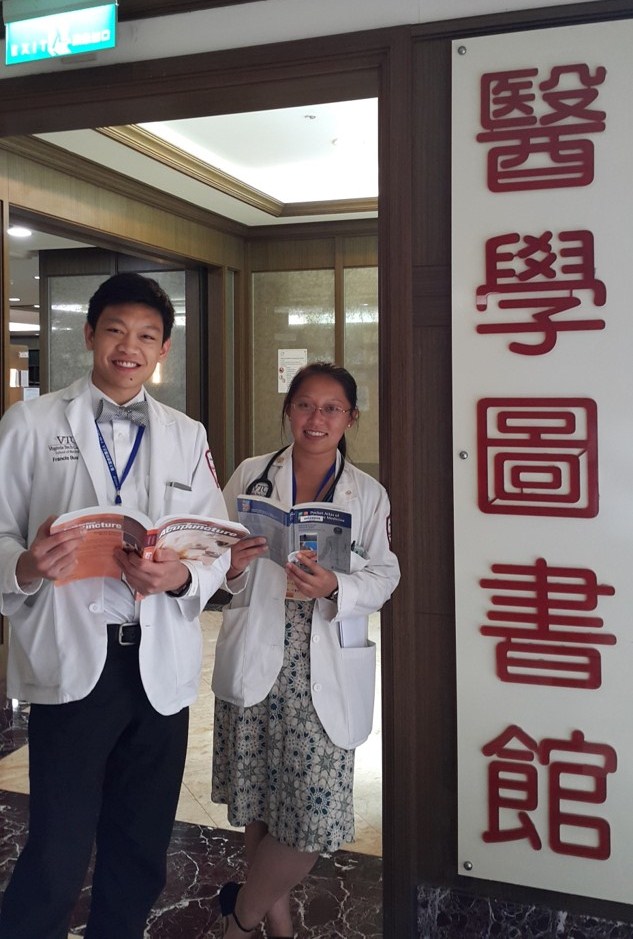International Rotation in Taiwan: Questions and Answers with Frances Bustos and Aiwen Liu, Class of 2017
August 2, 2017

In the spring of 2017, two students at the Virginia Tech Carilion School of Medicine took part in an international medical rotation at E-Da Hospital and I-Shou University College of Medicine in Kaohsiung, Taiwan. This was a new international rotation destination at the school. Frances Bustos and Aiwen Liu, who graduated only a few weeks after returning, shared some of their experiences in hopes that other students would choose this rotation in the future. Following are some of their remarks.
Q. Why Taiwan? What was the culture like? What surprised you?
Aiwen: Taiwan represented the perfect blend of Western and Eastern medicine. They have advanced modern medicine, but also a culture deeply rooted in ancient Chinese medicine. The culture is very warm, hospitable, and patriotic. I was surprised at waste management in Taiwan. One, it is nearly impossible to find a public trash can in Taiwan, yet the streets are pristine. When I asked a native, she said people have been conditioned since childhood to carry any trash they have with them, and littering is abhorred. Two, they have “singing” trash pickup trucks.
Q. What is Traditional Chinese Medicine (TCM) and why were you interested in learning more about it?
Frances: This is a type of medicine that has been practiced for centuries. The most succinct description of this is that it focuses on connections within the body rather than cause and effect. I wanted to discover how a mode of diagnosis so disparate from our own is able to solve the ailments of many patients.
Aiwen: As a Chinese immigrant, it was important for me to learn about this aspect of my cultural heritage. As a future physician and skeptical scientist, it was important for me to explore different styles of medicine to better educate and treat my patients.
Q. What are some differences between western medicine and TCM?
Frances: The most marked difference is the motive diagnosis between these two practices. TCM focuses on connections of the meridians in the body which govern our overall health. Western medicine focuses on cause and effect wherein a particular agent (perhaps a microbe) directly leads to a symptom.
Q. What was the strangest thing you ate or saw?
Frances: The strangest thing I saw was acupuncture directly into the eye. The practitioner was very eminent and seemed to be targeting the optic nerve.
Aiwen: For tourists, I know the expected “strange thing” to eat in foreign countries is probably bugs or unusual animals, but we were not fortunate enough to encounter either. The strangest things I ate in Taiwan would have to be either milk hotpot or stinky tofu.
Q. What was your favorite word or phrase you learned?
Frances: Xiao bing, wei tung = small ice, less sugar. That’s how I would order all of my bubble tea, a popular drink with tapioca pearls at the bottom.
Q. Did you do any sightseeing?
Frances: We visited Tainan which is known as the city of snacks. We also visited the capital of Taiwan, Taipei. We wanted to get a pulse on this country before leaving and contrast the north with the south.
Q. What did you do for fun in Taiwan?
Aiwen: Lots and lots of night markets, a staple in Taiwanese culture. Night markets are vibrant places for people and families to eat, shop, and socialize after work. We also did a lot of city biking, sightseeing, and karaoke (another staple).
Frances: We stayed in Kaohsiung, a city not as well-known as the capital city Taipei. The people there are kind displaying a certain type of southern hospitality to which we will always be grateful. The medical residents of the TCM Department took us out and showed us around town. They made us feel at home on the other side of the globe.


